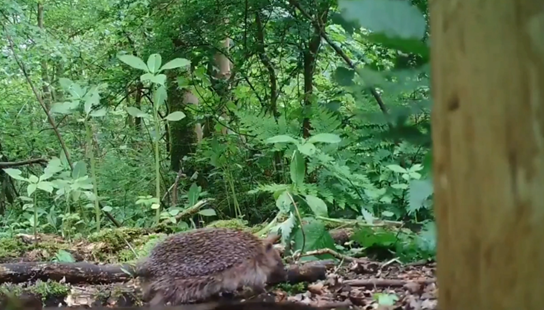
Wildlife campaigners are introducing a scheme to help hedgehogs in Salford by creating habitats and monitoring numbers in Peel Park.
Hedgehog Friendly Campus is a scheme funded by the British Hedgehog Preservation Society which aims to halt the decline of one the UK’s beloved wildlife creatures. The spiky mammal has declined by 50% since the year 2000, with less than a million of them left.
Marta Strzelecki, of the Hedgehog friendly campus and a member of Salford university’s sustainability team scheme, is organising surveys to monitor the species population.
She said, “There have been hedgehogs spotted on campus already, so we know some live or at least pass through the campus from time to time. We want to see if we are able to spot some of them and log them on the big hedgehog map.”
Marta said the other goals with these surveys is “to make sure that if that are any threats, anything that could harm hedgehogs on our campus, that we are able to quickly identify that and mitigate it.
“Also, we will be looking at locations for some hedgehog facilities that we want to add to the campus. So, we have one hedgehog house on the campus now, and we want to identify the best location for another house.

“We want to also identify possible locations for hedgehog highways, which are basically cut outs, or gaps in fences which allow hedgehogs to pass through different areas.”
Marta says any Salford residents looking to help preserve the hedgehog population in their own gardens or neighborhoods can cover drain holes safely, add small ramps to ponds to prevent drownings, and check grass before mowing lawns.
Holly Broadhurst, second year PHD student at Salford, specialises in monitoring and detecting mammals in natural environments, said, “This is mainly occurring due to habitat fragmentation, especially within urban areas. People will put up gates and fences which restrict the way they move.”
Hedgehogs can move up to 1-2 km every evening, and these barriers can therefore affect the amount of food they are able to find or affect their ability to find mates.
Holly also said, “The importance (of the scheme), is mainly to tell people about hedgehogs, because they’re a nocturnal species, so people generally don’t see them. They’re not really aware that they’re in their gardens. So, we just want to campaign, help people understand why they’re declining, what they can do to help them.

Campaigns like this are important right now due to the threats which hedgehog’s face, leading to the species officially being listed as Vulnerable to Extinction on Britain’s IUCN Red List, as of July 2020.















Recent Comments